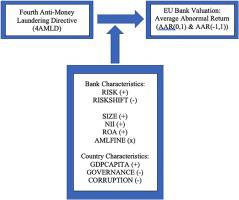Research in International Business and Finance ( IF 6.3 ) Pub Date : 2021-02-02 , DOI: 10.1016/j.ribaf.2021.101397 Arjan Premti , Mohammad Jafarinejad , Henry Balani

|
Anti-money laundering regulations have costs and benefits for banks. To better understand how these regulations affect banks, we study the valuation effects of the Fourth Anti-Money Laundering Directive (4AMLD) on a sample of European banks. First, using eight significant 4AMLD-related events between the initial announcement (February 5, 2013) and the final enactment (June 26, 2015), we show that the 4AMLD had a positive valuation effect on European banks and helped reduce their systematic risk. Then, using a cross-sectional model, we find that the positive valuation effect was higher for riskier, larger, and more profitable banks with more non-traditional revenue streams, as well as banks operating in rich countries, countries with less effective corporate governance, and countries with higher perception of corruption. These findings provide a better understanding of how anti-money laundering regulations affect banks in order to assist regulators in shaping future policies, as well as bank managers and investors in making better financial and investment decisions.
中文翻译:

第四反洗钱指令对欧盟银行估值的影响
反洗钱法规对银行有成本和收益。为了更好地理解这些法规对银行的影响,我们研究了第四反洗钱指令(4AMLD)对欧洲银行样本的估值影响。首先,我们使用了从最初宣布(2013年2月5日)到最终颁布(2015年6月26日)之间的8个重大4AMLD相关事件,我们证明了4AMLD对欧洲银行具有积极的估值作用,有助于降低其系统性风险。然后,使用横截面模型,我们发现,对于具有更多非传统收入流的风险更大,利润更大的银行,以及在富裕国家/地区,公司治理效率较低的国家/地区运营的银行,其正估值效应更高。 ,以及对腐败有较高认识的国家。











































 京公网安备 11010802027423号
京公网安备 11010802027423号